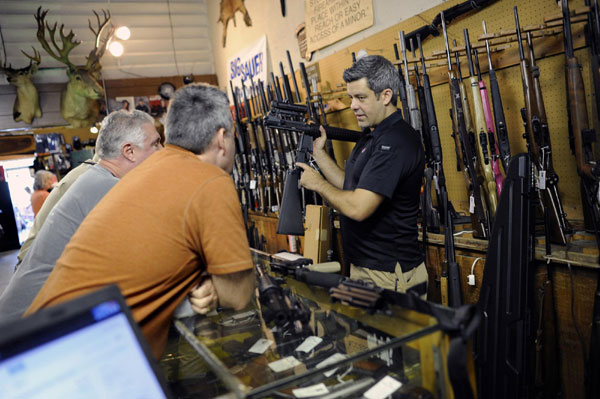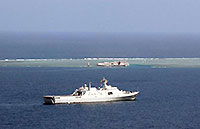US gun sales up as control proposals unveiled
(Xinhua) Updated: 2013-01-17 14:27
 |
|
Gun shop owner Brooke Misantone (R) shows his last two AR-15 style rifles to a group of customers as gun enthusiasts start to crowd into the Bullet Hole gun shop before an expected gun control announcement by US President Barack Obama in Sarasota, Florida January 16, 2013. US Vice President Joe Biden and other members of Obama's cabinet have held a series of meetings with officials in the weapons and entertainment industry as part of a task force requested by the president after the December 14 school shooting in Newtown, Connecticut, in which 20 children and six adults were killed.[Photo/Agencies] |
CHANTILLY, the United States - Donnel Dover, general manager at the gun shop Blue Ridge Arsenal in Chantilly, Virginia, can hardly keep up with the flow of customers recently as he mans the cash register.
Business is humming even on a weekday, as customers meander around the store and browse a range of automatic rifles on showroom walls and handguns encased in glass.
US gun sales are soaring nationwide, just as President Barack Obama unveiled sweeping measures Wednesday aimed at curbing gun violence one month after the massacre in Newtown, Connecticut that killed 20 elementary school students.
At gun stores nationwide, business is booming, and one particularly well-selling firearm is the AR-15, used in the Newtown killings.
"Right after the shooting, there were more people in here, more people with questions," Dover said, referring to last month's massacre.
But it was the fierce gun control debate that erupted in Washington on the heels of the shootings that sparked a rise in gun purchases, he told Xinhua.
"With a lot of customers, it was 'I was thinking of buying an assault rifle, but I wasn't in a rush for it but now I want one because I don't want to lose out on an opportunity to have one,'" he said of his customers' decisions to purchase a firearm.
Indeed, US states including Virginia, Colorado, Tennessee, Nevada and California saw background checks -- required of those purchasing firearms at licensed dealers -- soar after last month's shooting spree in Newtown, when a gunman sprayed classrooms full of children with bullets.
Overall, the US saw 2.2 million background checks for gun sales last month, a sharp increase of nearly 59 percent from the same month in 2011, according to gun trade-group National Shooting Sports Foundation.
Virginia State Police spokeswoman Corinne N. Geller said December requests for criminal background checks in that state saw a 79 percent increase from the same period the previous year, on top of the typical rise that comes around the holidays, during hunting season and during election years.
"We had record number of transactions (background checks) following Newtown, but all of that factors in," she said, adding that one day saw 5,000 background checks, up more than twice the average 2,000 checks per day in that state.
Meanwhile, President Barack Obama on Wednesday unveiled a package of gun control proposals including closing background check loopholes, banning "military style" assault weapons, and limiting magazines to 10 bullets, as well as signing 23 executive orders.
Experts said a ban on assault weapons will have a tough time passing in a bitterly divided Congress, and gun proponents point out that the second amendment of the US Constitution protects their right to bear arms.
The amendment, however, is not absolute, and courts and past presidents, including Republican President George Bush Sr., were in favor of some gun control legislation.
Adam Winkler, constitutional law expert at University of California, Los Angeles, said most of the measures under consideration in Washington are legal under the US Constitution, including a ban on assault weapons, although that opinion is not unanimous among experts.
Legality rests on whether a weapon is in common use, or whether it is unusual, he said Tuesday at a summit on gun violence at Johns Hopkins University.
Still, some criminologists argue a ban on assault weapons will not stop a determined mass murderer, who will use a pistol, a bomb or a knife if he has no access to assault weapons, although others say some laws could at least reduce the carnage.
While many Americans favor the type of beefed up background checks the president proposed, there may be limits on effectiveness, as criminals usually do not get their guns from licensed dealers, said Philip J. Cook, professor at Duke University, on Monday at the same summit. Instead, they obtain them from markets that do not require background checks, he said.
Dover echoed that sentiment, saying that criminals are not likely to purchase firearms at his store, adding that he has turned away customers who had odd demeanors or seemed to be in a rush.
A Gallup poll released Monday found Americans' dissatisfaction with current gun laws spiked by 25 percent from the same period a year ago, although 43 percent remain satisfied with current laws.







